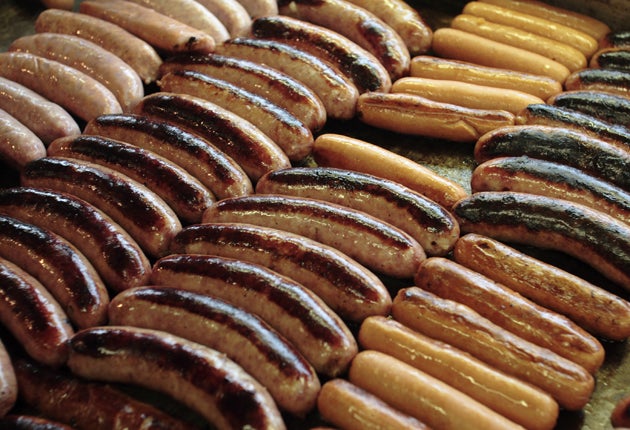Processed meats 'raise risk of heart disease'

Your support helps us to tell the story
From reproductive rights to climate change to Big Tech, The Independent is on the ground when the story is developing. Whether it's investigating the financials of Elon Musk's pro-Trump PAC or producing our latest documentary, 'The A Word', which shines a light on the American women fighting for reproductive rights, we know how important it is to parse out the facts from the messaging.
At such a critical moment in US history, we need reporters on the ground. Your donation allows us to keep sending journalists to speak to both sides of the story.
The Independent is trusted by Americans across the entire political spectrum. And unlike many other quality news outlets, we choose not to lock Americans out of our reporting and analysis with paywalls. We believe quality journalism should be available to everyone, paid for by those who can afford it.
Your support makes all the difference.Eating processed meats like bacon, ham and sausages can increase the risk of heart disease and diabetes, according to new research.
Processed meats are already linked to a higher chance of developing bowel cancer but a round-up of worldwide research has shown a link with other conditions.
A review by the Harvard School of Public Health in the US found people who eat processed meats have a 42% higher risk of heart disease and a 19% increased risk of Type 2 diabetes.
However, unprocessed red meats, such as beef, pork or lamb, do not raise the risk.
Experts examined 20 worldwide published studies involving more than a million people.
They found a 42% increased risk of heart disease and 19% increased risk of Type 2 diabetes for each daily serving, on average, of 50g of processed meat.
A serving of 50g is roughly the equivalent of two rashers of bacon or one hot dog.
Writing online in the journal Circulation, the authors said: "Consumption of processed meats, but not red meats, is associated with higher incidence of coronary heart disease and diabetes mellitus (Type 2).
"These results highlight the need for better understanding of potential mechanisms of effects and for particular focus on processed meats for dietary and policy recommendations."
The authors said that, until now, studies have shown an inconsistent link between meat, heart disease and diabetes.
They defined processed meat as any meat preserved by smoking, curing or salting, or with chemical preservatives added to it.
Examples include bacon, salami, sausages, hot dogs and processed deli or luncheon meats.
The authors found the effects held true even when lifestyle factors that could affect the results were taken into account.
They noted that the lifestyle factors of people who ate processed meats were similar to those who ate unprocessed meats, yet processed meats were still linked with a higher risk.
Lead author Renata Micha, a research fellow in the department of epidemiology, said: "When we looked at average nutrients in unprocessed red and processed meats eaten in the United States, we found that they contained similar average amounts of saturated fat and cholesterol.
"In contrast, processed meats contained, on average, four times more sodium and 50% more nitrate preservatives.
"This suggests that differences in salt and preservatives, rather than fats, might explain the higher risk of heart disease and diabetes seen with processed meats, but not with unprocessed red meats."
Salt is known to increase blood pressure, which increases the risk of heart disease.
Studies on animals have also shown that nitrate preservatives can cause a build up of hard deposits in the arteries and reduce the body's ability to handle sugars, which can increase the risk of heart disease and diabetes.
Ms Micha said: "To lower risk of heart attacks and diabetes, people should consider which types of meats they are eating.
"Processed meats such as bacon, salami, sausages, hot dogs and processed deli meats may be the most important to avoid.
"Based on our findings, eating one serving per week or less would be associated with relatively small risk."
Two rashers of bacon a day throughout life has been linked to a 20% increase in the risk of developing bowel cancer.
Men in the UK eat an average of nearly 50g of processed meat a day compared with just 24g for women, research has shown.
The average person has a risk of bowel cancer of five in 100 but this rises to six in 100 if they eat an extra 50g of processed meat per day, according to the World Cancer Research Fund (WCRF).
Their scientists estimate that about 3,700 of the 37,000 new cases of bowel cancer in the UK each year could be prevented if everyone ate less than 70g of processed meat per week - roughly three rashers of bacon.
Victoria Taylor, senior heart health dietician at the British Heart Foundation, said: "The study didn't look at why processed meats were linked with heart disease and unprocessed meats weren't.
"However, they suggested this might have been due to the preservatives, like salt, added to processed meat.
"If you like red meat, this can still be included as part of a balanced, heart-healthy diet.
"Go for lean cuts and aim to cook from scratch using healthier cooking methods like grilling or baking.
"If you need to add flavour, then try using fresh and dried herbs, spices and chilli instead of salt."
Join our commenting forum
Join thought-provoking conversations, follow other Independent readers and see their replies
Comments